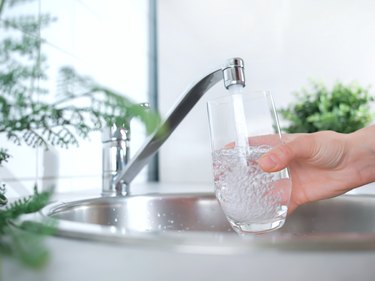
When you have a well, you get used to the pump kicking off and on, so you'll notice quickly if it never shuts off. The constant running can be due to a variety of issues, from low water to malfunctioning parts. Understanding how well pumps work and knowing the common issues help you fix the problem.
How Well Pumps Work
There are different types of well pumps that work slightly differently, but they all move water from your well into your storage tank. When it's working correctly, the pump runs until it pumps enough water into the tank to reach a specific pressure. The pump then shuts off until the pressure in the tank drops to a certain level, which happens as you use water. It turns off and on throughout the day to maintain the storage tank pressure within the determined range.
Video of the Day
1. Excess Water Use
If you're using lots of water, your well pump might work overtime to keep up. Sometimes, this can happen if someone accidentally leaves a faucet running. Check all the indoor and outdoor faucets to ensure they're all off before checking other issues.
Video of the Day
2. Too Little Water
If the water level in the well drops too low, the well pump can't work properly. This can happen during periods of drought or if local water demand increases. When the amount of water or flow rate drops, your pump will keep running. This situation is usually out of your control, but a plumber can tell you if this is the issue or if you have another problem.
3. Loss of Prime
Jet pumps sit above the ground and need to be primed, which means filling the intake pipe with water. This creates suction to move the water from the well to the tank. Losing the prime can happen if you haven't used the pump for a while or if there's a leak in the pipe. When this happens, the pump isn't creating the necessary suction to raise the water, so it runs constantly.
Avoid running your pump if you suspect it lost its prime, as this can damage the motor. You can try priming your well pump if you think this is the issue. If priming doesn't work, there could be a leak, and a plumber can repair it.
4. Leaks in Pipes
Leaky pipes make it impossible for your water system to reach the required pressure for the pump to stop running. This is especially true if the pipe leading from the well to the pressure tank has leaks; older well pipes are often galvanized and can corrode. It'll bring some water into your tank, but if enough water leaks out, the tank might not reach a high enough pressure to shut off the pump.
If you have leaks, you might notice wet areas in your lawn. A plumber can locate and repair the leaks by replacing the pipes.
5. Damaged Pressure Control Switch
Your well has a pressure control switch to turn the well pump off and on based on the pressure in the tank. If it stops working correctly, it might not cut off the pump. It's also possible that the switch setting is too high, so the pump can't achieve the top pressure measurement.
Let a professional adjust the switch since it's an electrical component near water. A pro can check the settings and determine if it's damaged and needs to be replaced.
6. Damaged Well Pump
Well pumps can become damaged, or normal wear and tear can damage the pump. Some issues can be repaired, but you may need to replace the well pump if it's malfunctioning. Call a well service company or plumber to determine if the well pump is damaged.